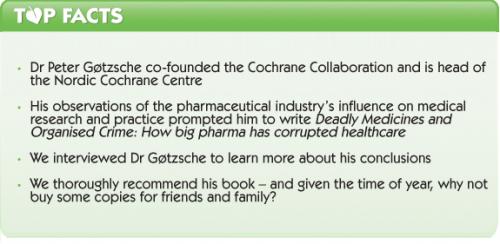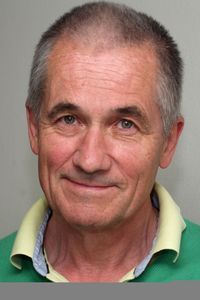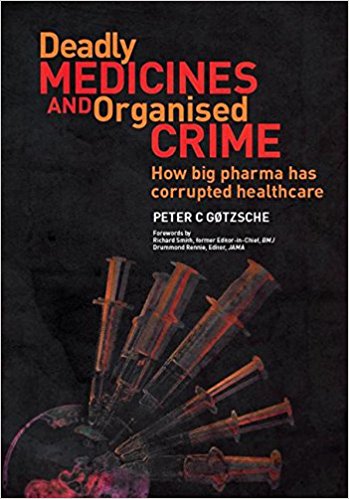Content Sections
When a co-founder of evidence-based medicine’s standard-bearer, the Cochrane Collaboration, describes the pharmaceutical industry as akin to the mafia, it’s time to sit up and take notice. That’s precisely what Dr Peter C Gøtzsche, who is also head of the Nordic Cochrane Centre, has done with Deadly Medicines and Organised Crime: How big pharma has corrupted healthcare. Read our exclusive interview with Dr Gøtzsche below to learn more about his findings.

Valuable opinions
Dr Gøtzsche’s is the latest in a lengthening procession of books exposing the murky underbelly of the pharmaceutical industry. Most recently, we’ve had Ben Goldacre’s Bad Pharma, along with other notable examples by Marcia Angell and Richard Smith, former editors of the New England Journal of Medicine (NEJM) and the British Medical Journal (BMJ), respectively.
But this is the first time such a broadside has been launched by someone so intimately acquainted with the published medical literature. Dr Gøtzsche’s current tally runs to forty meta-analyses and systematic reviews published in the Cochrane Database of Systematic Reviews alone: the fruits of many years’ forensic examination of medical data. Dr Gøtzsche knows what he is talking about, and his opinions carry significant weight.
Total demolition
He doesn’t hold back. In the opening pages of a book the author describes as a “polemic” – because “There is little point in describing what is working well in a system that is out of social control” – we learn that “In the United States and Europe, drugs are the third leading cause of death after heart disease and cancer.” The following two hundred-odd pages are then spent explaining, in close but fascinating detail, how this murderous monster escaped its shackles. We covered many of the tricks and tactics used by pharma to twist the literature to their advantage in our review of Bad Pharma so we won’t recap them here. Suffice it to say that, way before the end of Deadly Medicines and Organised Crime, you will likely be in full agreement with Dr Gøtzsche that “Organised crime [is] the business model of big pharma,” an industry comprising companies that “Don’t sell drugs, they sell lies about drugs”.
Interview with Dr Peter Gøtzsche
We wanted to learn more about this important new book from the author himself. so we put together a list of questions to which Dr Gøtzsche was kind enough to respond by email. The questions and answers are reproduced below with minimal editing by ANH-Intl.

Dr Peter Gøtzsche, author of Deadly Medicines and Organised Crime: How big pharma has corrupted healthcare
ANH-Intl: What do you think is the single biggest threat to the safe practice of medicine that ensures the delivery of the highest quality care and best possible outcomes?
PG: That we have allowed the industry to be its own judge. As long as testing drugs is not a public enterprise, performed by disinterested researchers, we cannot trust what comes out of it.
ANH-Intl: How important are non-pharmaceutical approaches to the combat of escalating rates of major chronic diseases, such as heart disease, cancer, type 2 diabetes and obesity?
PG: Non-pharmaceutical approaches can be more important than drugs. Exercise works equally well for diabetes and depression as drugs and, in contrast to drugs, it has many other beneficial effects. Psychotherapy for depression doesn’t make people dependent on drugs and doesn’t turn transient problems into a chronic disease when people cannot stop taking their drugs. Most important of all, we need to tackle the food industry and ban junk food and junk drinks.
ANH-Intl: What is your opinion of the AllTrials initiative in terms of its potential to significantly improve the objectivity of the medical literature in future?
PG: I have campaigned for access to all data, including the raw data, from research on patients for many years. In 2010, we succeeded in gaining access, for the first time in the world, to unpublished clinical study reports at the European Medicines Agency, which had the effect that the Agency changed its policy from one of extreme secrecy – like the current FDA policy – to one of candid openness. This was to the drug industry’s great chagrin, as its business model hinges on publishing flawed research.
ANH-Intl: Similarly, do you think a sea-change in medical student education is needed to deliver better health outcomes, especially for chronic degenerative diseases?
PG: Yes. There is far too much focus on drugs as the solution to everything and far too little focus on their harms, and the education by necessity builds on flawed research, as this is what gets done and published.
ANH-Intl: Towards the end of your book you state that “What we should do is...identify overdiagnosed and overtreated patients, take patients off most or all of their drugs, and teach them that a life without drugs is possible for most of us.” Can you please explain this a little further? Should the removal of drugs be accompanied with any new modality, and if so which ones might be among the most important?
PG: Removal of drugs should usually not be accompanied by the introduction of other types of treatment. Many patients would gain a better quality of life if their drugs were taken away from them. What we need is to remember Bobby McFerrin’s song: “Don’t worry, be happy”. We shall all die, but we should remember to live while we are here without worrying that some day in the future we might get ill. It is daunting how many healthy people are put on drugs that lower blood pressure or cholesterol, and it changes people from healthy citizens to patients who may start worrying about their good health. This can have profound psychological consequences apart from the side effects of the drugs that the patients don’t always realise are side effects, e.g. if they get more tired or depressed after starting antihypertensive therapy or experience problems in their sex life.
ANH-Intl: What can the public and patients do to help redress the situation? Are they effectively disempowered or are there things they can do to help build a more functional healthcare system?
PG: First of all, the public needs to know the extent to which they are being deceived in the current system, e.g. few people know that prescription drugs are the third major killer. If drug testing and drug regulation were effective, this wouldn’t happen.
ANH-Intl: Numerous problems with the medical literature are cited in your book, among them unpublished trials, fiddled statistics, unsuitable comparators and other methodological weaknesses and the preponderance of academic ‘flak’ in the form of weak, industry-sourced publications designed to muddy the waters. Bearing this in mind, what advice would you have for anyone wishing to locate high-quality published data?
PG: There are very little high-quality published data. Neither the drug industry nor publicly employed researchers are particularly willing to share their data with others, which essentially means that science ceases to exist. Scrutiny of data by others is a fundamental aspect of science that moves science forward, but that’s not how it works in healthcare. Most doctors are willing to add their names to articles produced by drug companies, although they are being denied access to the data they and their patients have produced and without which the articles cannot be written. This is corruption of academic integrity and betrayal of the trust patients have in the research enterprise. No self-respecting scientists should publish findings based on data to which they do not have free and full access.
ANH-Intl: Are there any classes of drug, as opposed to individual products, for which, in your opinion, there is no valid scientific or medical justification for their use in healthcare?
PG: There are several classes of drugs, e.g. cough medicines and anticholinergic drugs for urinary incontinence, where the effect is doubtful but there is no doubt about their harms, which in my opinion means they should be withdrawn from the market. There are many other types of drugs that likely have no effect. All drugs have side effects, and it is therefore difficult to blind placebo-controlled trials effectively. We know that lack of blinding leads to exaggerated views on the effect for subjective outcomes, such as dementia, depression and pain, and it is for this reason that many drugs, which are believed to have minor effects, likely aren't effective at all.
There are also classes of drugs where, although an effect has been demonstrated, their availability likely does more harm than good. I write in my book that, although some psychiatric drugs can be helpful sometimes for some patients, our citizens would be far better off if we removed all the psychotropic drugs from the market, as doctors are unable to handle them. Patients get dependent on them, and if used for more than a few weeks, several drugs will cause even worse disorders than the one that led to starting the drugs. As far as I can see, it is inescapable that their availability does more harm than good.
ANH-Intl: The chapter in your book entitled “Intimidation, violence and threats to protect sales” begins as follows: “It takes great courage to become a whistle-blower. Healthcare is so corrupt that those who expose drug companies’ criminal acts become pariahs.” Have you experienced any blowback since publishing the book?
PG: No, quite the contrary, as people have praised the book. I don't hear from the drug industry of course, but I have seen blunt lies about the book being propagated by drug industry associations and their paid allies among doctors.
It’s nearly Christmas!
Deadly Medicines and Organised Crime comes with the highest possible ANH-Intl recommendation. You could make a real difference by gifting copies of this book to those around you think would benefit most from knowing about what’s really going on in so-called healthcare. The sooner enough people know about what an all-encompassing and lethal scam pharma-led medicine has become, the sooner people will simply withdraw their support and things will change.
Why not spread some truth with your seasonal cheer?
>>> Return to homepage








Comments
your voice counts
28 November 2013 at 10:13 am
Doctor PG has stated clearly what many of us feel but do not always have the words or background to substantiate - thanks for this
28 November 2013 at 4:18 pm
Dear ANH
Thank you for highlighting Dr Grotzsche's new book. It is indeed extraordinarily outspoken. However I would have liked him to also give some comment on what is actually working well in conventional medicine by way of contrast to all that is going wrong.
Dr James Penstons's book 'Stats.con: How We've Been Fooled by Statistics-Based Research in Medicine' suggests that even if there was no unethical behaviour in medical research the statistic-based approach would still be unable to provide the data we need. Funnily enough it seems that no conventional medical experts have responded to the points Dr Penston raises.
If you could get Dr Grotzsche and/or Dr Goldacre to comment on Dr Penston's book that might be very informative.
18 December 2013 at 11:42 pm
The editor of NEJM and BMJ and now the co founder of the Cochrane Collaboration have said it. Can someone please point out a bigger crime in history? As far as pointing out what works in medicine rather than what doesnt, I believe Dr.Grotzsche did. What works well is the elimination of junk food, junk drinks, drugs in most cases, the inclusion of exercise and psychotherapy (they dont happen to be a major part of medicine, I know, but perhaps what works well in health care would be a more relevant question).
22 January 2014 at 8:08 am
Modern medicine still works well if you are have a serious infection that is treatable with antibiotics (though for how much longer?)or you are injured in an accident,fracture a limb or have a life threatening surgical condition amenable to repair, like a gut obstruction or a gallbladder about to rupture. A knee replacement can be a life transforming operation if you are in so much pain from osteoarthritis of the knee that you cannot walk, and all other measures have failed.
27 January 2014 at 12:20 am
The comment about modern medicine working well actually is saying that modern SURGERY works well. We have made enormous and GOOD strides in surgery. Lots more to do.
Internal Medicine is the backwater. It has done little more than taken us beyond leeches and trying to alter our "humors" by blowing shotgun blasts of chemicals into complex and inter-related enzyme systems, where the intended results is more a side-effect of dozens of other reactions, none of which are good!
When we get to nano-pharmacy, directing a single therapy at a single step in an enzyme pathway or bind to a specific site, then we can say the era of modern Internal Medicine has arrived.
Meanwhile, the revelations that 800,000 Europeans have died in the last 5 years from a pre cardiac surgical protocol is so stagerring that it is hard to know what to say to this. That paper, btw, was pulled from The European Heart Journal within in hour of its release! Incredible. Coverup on coverup.
14 April 2014 at 9:55 am
I have amassed over 280 quotations for my own book, sourced from more than 170 entities, which mainly accuse Big Pharma of these crimes against humanity in the most unambiguous terms. It comes as no surprise therefore, that a forensic examiner of medical data (from the Cochrane Collaboration, no less!) should eventually come out into the open and state these very same things.
The FDA and similar organsisations in Europe, Britain, Canada, Australia and elsewhere are themselves crimes against humanity - crimes committed by the pharmaceutical cartel.
Money is power and the greed that goes with it is limitless. The corruption that spreads from it is so deeply entrenched that only a greater power can lay siege to its fortress and eradicate it.
Such a power does not presently exist, mainly due to continuing ignorance among the majority of people in these very same countries, although the Internet has begun to influence a change in that condition. And that's what is needed - information and education of a 'critical mass' of people aware enough and committed enough to overturn this pharmaceutical controlled status quo.
That the day will inevitably come when this status quo meets its demise, I have no doubt, for it must.
The pharmaceutical cartel is a heinous parasite, which may be compared with a bacterial pathogen. It slowly kills that which hosts and feeds it. It grows and multiplies, it produces more poisons, does more harm and it demands ever more from the host without providing any discernible benefit, until the host can no longer sustain it, or perhaps can no longer even survive it.
So the end of the drug-based medical system as we presently know it is inexorably approaching and the pharmaceutical cartel is one of the major forces driving its own future demise.
Equally, I have no doubt that the transformation will not be within my own lifetime, whether that be due to collapse from economic unsustainability, or overpowering opposition by an awakened public. It's not happening quickly enough - not by a long chalk.
That's where public awareness must take up its role in the transformation and pre-empt the unsustainability collapse. The pathogen should better be eradicated and pre-empt sacrificing the host.
13 August 2014 at 7:16 am
In terms of Gøtzsche's book having been on the receiving end of "blunt lies" is probably no surprise to him. Gøtzsche had published lots of anti-mammogram data in the previous years where strong mammography proponents with large vested interests had belittled him as a "pseudo-skeptic" and seriously twisted Gøtzsche's view on the value of mammography (google/bing "A Mammogram Letter The British Medical Journal Censored" or go to http://www.supplements-and-health.com/mammogram.html ) trying to diminish his truthful contribution. The medical industry is a mafia lobby.
06 March 2015 at 11:38 am
Hi there! This post could not be written any better!
Reading this post reminds me of my old room mate!
He always kept talking about this. I will forward this article to him.
Pretty sure he will have a good read. Thanks for sharing!
01 October 2017 at 1:51 am
Will Peter Gotzsche be coming out to Australia again in the near future?
Your voice counts
We welcome your comments and are very interested in your point of view, but we ask that you keep them relevant to the article, that they be civil and without commercial links. All comments are moderated prior to being published. We reserve the right to edit or not publish comments that we consider abusive or offensive.
There is extra content here from a third party provider. You will be unable to see this content unless you agree to allow Content Cookies. Cookie Preferences